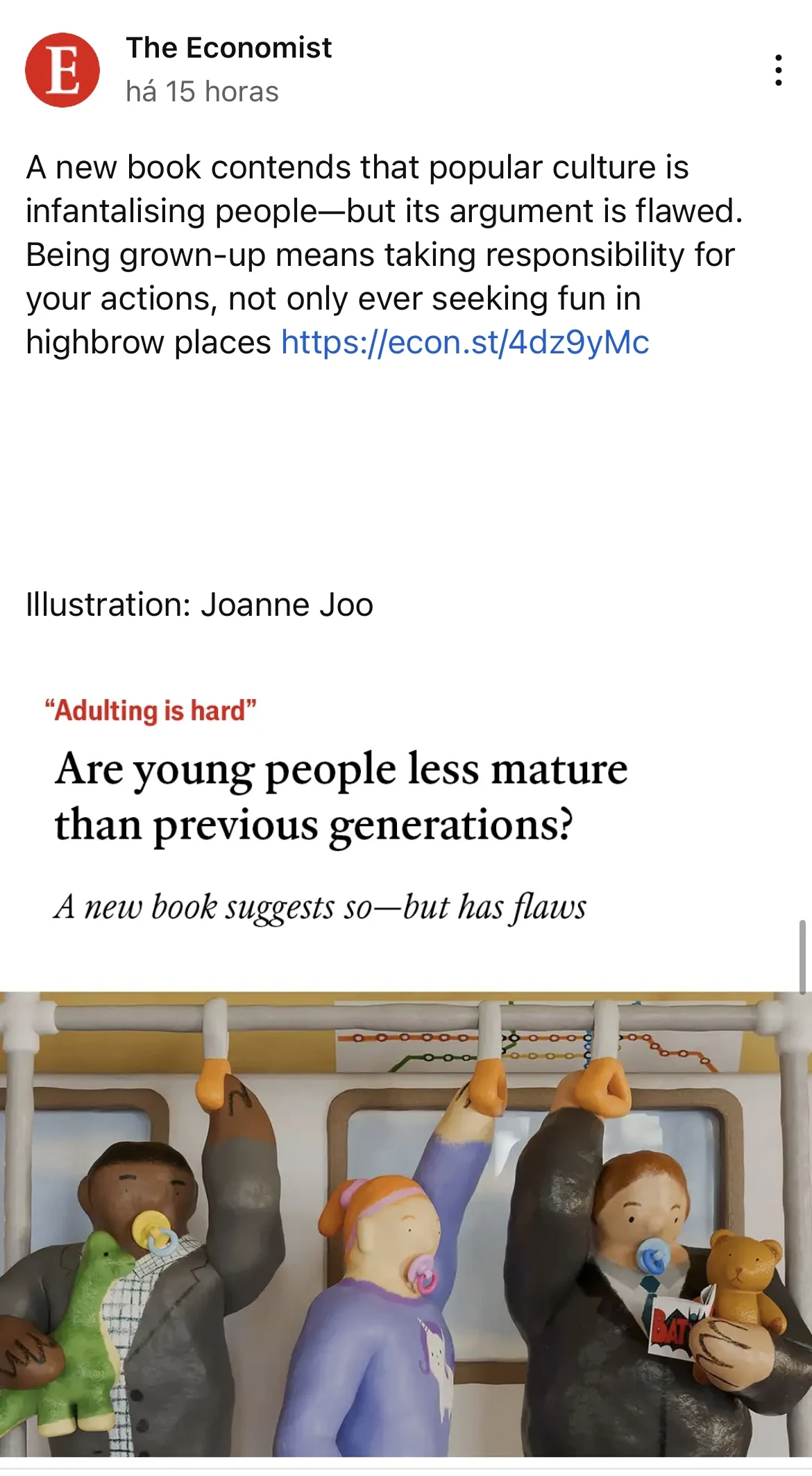!neolibs !bookworms there's a book "Infantilised" by a Bong author.
https://www.goodreads.com/book/show/199617292-infantilised
The first link is The Economist article.
Some highlights
Over many years as a lecturer, Mr Hayward grew concerned that his 18-year-old students "resembled less mature teenagers on the cusp of adulthood and more fearful schoolchildren adrift in an alien world of adult autonomy". One arrived in class dressed in a onesie, noting that it was cold and he liked to feel comfortable. Was he not "concerned about the infantilising overtones of such a garment?" asked Mr Hayward. "No, I want to be treated like a kid," came the reply. "Adulting is hard."

Finally, Mr Hayward chides the liberal commentariat. On the one hand, they celebrated Greta Thunberg, a former schoolgirl activist, as an "all-knowing sage", despite her possessing "no scientific expertise" and saying "nothing original whatsoever about climate issues". This, he claims, is evidence of "a role reversal in which young people are increasingly assigned the intellectual gravitas and cultural authority to educate adults".

A lot millennial writing consists on adults behaving like children and children acting as sage creatures "lecturing" adults. Greta Thunberg is just a symptom of that. !writecel gives us some pf the worst examples of "wise kids" tropes on media.
But Mr Hayward's argument has two flaws. One is that it is so grumpy. Why shouldn't adults dress up as comic-book characters, if they enjoy it? What is wrong with liking the "Wallace and Gromit" animated films? Being grown-up means taking responsibility for your actions; it does not mean only ever seeking fun in highbrow places.
Lmao, "Just let people enjoy things" journo version






 aweonao
aweonao





Jump in the discussion.
No email address required.
If I accept the premise I wonder how much is a response to Future Shock as it were.
Since the advent of the internet and especially smartphone things happen at the speed of light (literally, thanks to fiber optic cables) and I think young peoples brains have broken a bit trying to catch up with society as it is now. The regression here may be less regression to childhood but a regression to a slow past.
Just as an example, all of the steps of my house purchasing process took place on my phone beyond the final paperwork. The most material property most people will own in their lives can be handled through the glowing brick while on the potty.
!zoomers !schizos - what do you think?
Jump in the discussion.
No email address required.
I had a discussion here with someone in !neolibs about the effect of the internet did not have the economic impact that was widely expected. (compared to other "revolutions").
I had disagreed but on further reflection and study I believe they were correct. The effect of the telegraph was a nuclear bomb compared to the economic impact of the internet. Perhaps the impact of the internet is ultimately a social/mental one.
Jump in the discussion.
No email address required.
That's an interesting thought. I suppose the relative decrease in time was greater. With the telegraph communication that would have taken days or weeks was reduced to minutes, while the internet reduced communication of minutes or hours down to seconds.
Although the internet, especially when combined with the smartphone, has allowed for much greater variety and flexability of communication so I'm not really sure which one at this point lead to the greater relative advancement.
Jump in the discussion.
No email address required.
More options
Context
The internet's impact has been just as massive imo but less visible in lines because its good is offset by its bad.
IMO the internet really does raise productivity a lot, but in the same vein it enables a lot of wasted time and distractions. Being able to respond in 5 minutes with an email hardly matters if the employees spend an hour playing video games before sending that email. The same tradeoffs apply to education with increased access but also cheating and not paying attention. The top 20% of people probably benefit a ton from the internet and the bottom 80% are slightly worsened by it.
Jump in the discussion.
No email address required.
The assumption that faster communication leads to increased efficiency rather than more downtime is flawed
especially when some people agonize for a long time over the wording of emails/texts - not a problem for me personally but I know people who shamelessly talk about experiencing anxiety over those lol.
Jump in the discussion.
No email address required.
I don't know why you people think workers didn't slack off all the time before the internet.
Jump in the discussion.
No email address required.
It's not necessarily that the internet made slacking worse, it's that it didn't alleviate the problem of slacking like many people thought it would
Jump in the discussion.
No email address required.
More options
Context
More options
Context
More options
Context
More options
Context
The internet just isn't that profitable. Much of the corporate internet is and was designed to scam investors who hope holding a monopoly position occupied will result into cash raining from the sky eventually rather than to make a profit.
Jump in the discussion.
No email address required.
More options
Context
Krugman was right.
Jump in the discussion.
No email address required.
The spirit of his statement was right but his actual statement was wrong.
Jump in the discussion.
No email address required.
He was right in all things. You just haven't understood him yet.
Jump in the discussion.
No email address required.
More options
Context
More options
Context
More options
Context
The internet has a massive impact on modern economies, you just seem to be looking past it, perhaps because you're so used to its presence.
Yes, the telegraph was also hugely impactful (well at least once they started laying undersea cables), but its bandwidth was very low and it could only be used for text messages. And not even really person-to-person text messages either - if I wanted to send you a telegraph, I'd have to go to the telegraph station myself, order the telegraph sent, it would be received at the other end, transcribed onto a piece of paper, and then delivered to you. That's categorically slower than even simple stuff like SMS these days which allows truly instantaneous communication and a back-and-forth discussion.
With the internet you can, for example, instantly send updated blueprints from your engineering center to the manufacturing center off in another time zone. Before the internet (but after the telegraph) you'd have to mail it. Not to mention the huge increase in access to information - if I'm working on a project and need info about something, I don't need to go down to a library or whatever to find that info, I can just search for it online and get it instantly.
I'll admit though that it's difficult to really separate the impact of computers with the impact of the internet, since they're so incredibly intertwined.
Jump in the discussion.
No email address required.
The question is why we don't see that impact in the economy like we did for the Industrial Revolution or such
https://en.wikipedia.org/wiki/Productivity_paradox
Jump in the discussion.
No email address required.
lmao who wrote that wiki page
What sense is there in comparing a cumulative 20-year increase in computing capacity with per-year productivity growth? Why wouldn't you just compare the cumulative productivity growth?
Anyways my opinion on this is that absurd levels of bureaucracy are to blame. I used to work at a giant engineering conglomerate and saw that in spades. I'd estimate at least half the employees didn't do anything productive. I mean really, they'd do literally nothing. Maybe make a powerpoint every month but that's it. I think IT has enabled drastic productivity increases but people don't want to lose their jobs so now most of what happens at big companies is pointless make-work just to keep people employed. This is what the bottom-level employees want because they don't want to lose their jobs. The middle managers like it too because it increases their number of subordinates which are a key measure to their career growth, and most of them wouldn't really directly benefit from reducing headcount anyways.
I mean just look at something like Twitter. Musk fired, what, 75% of employees? Still worked fine. Turns out they had 4x the number of employees they needed. Most large companies are like that, especially tech ones. I know that's a very modern example and I wasn't in the workforce in the 80s so I can't say but I doubt the issue just sprung into being in the 21st century.
I'm not going to claim that the internet is as impactful as switching to inanimate power sources (the industrial revolution), but I would argue that it's probably had the largest impact on our economy of any factor in the past several decades.
Jump in the discussion.
No email address required.
More options
Context
More options
Context
Jump in the discussion.
No email address required.
More options
Context
More options
Context
More options
Context
It's been downhill ever since the Rothschilds through the House of Saxe-Coburg and Gotha skinwalkers blew up the Titanic with thermite and planted the iceberg to eliminate the last enemies to a global system of interlinked "central" banks tbh
blew up the Titanic with thermite and planted the iceberg to eliminate the last enemies to a global system of interlinked "central" banks tbh
Jump in the discussion.
No email address required.
Jump in the discussion.
No email address required.
Jump in the discussion.
No email address required.
More options
Context
More options
Context
bitcoin fixes this
Jump in the discussion.
No email address required.
!eurochads !germs
Jump in the discussion.
No email address required.
More options
Context
More options
Context
It all went wrong in 1789.
Jump in the discussion.
No email address required.
You don't buy a house, dumbass. What do you think this is, 1785?
Jump in the discussion.
No email address required.
More options
Context
More options
Context
More options
Context
2020s felt like a smaller jump from 2010 than the 2000s did from 1990.
Stuff like doing all your contracts on docusign was more "oh nice, finally" than "omg no way"
Jump in the discussion.
No email address required.
People always mistake sigmoid curves for exponential ones.
Jump in the discussion.
No email address required.
More options
Context
More options
Context
I feel nostalgia for a time I barely knew
I weep for a life I never got to live
and I shudder as the sun rises on a glorious new day.
inventions of man shield me from him
alone, staring through a plastic window, the world inside.
not the world that was, the one that trudges on out there
something new. terribly lonely in our 'communities'
together but apart. so far away
and I type
Jump in the discussion.
No email address required.
Jump in the discussion.
No email address required.
More options
Context
More options
Context
You didn't go to the house before you bought it? Hired an inspector to walk through it? Negotiate with the broker? Yeah you browse the listings on Zillow but beyond that most of that process lies in the material world
Jump in the discussion.
No email address required.
Yeah I was there multiple times and everything but I legitimately signed multiple binding legal documents while using the restroom.
Jump in the discussion.
No email address required.
So you typed your initials in docusign for some of the initial paperwork. You still had to go sit with lawyers representing both yourself and the seller with a bank certified check (which you also had to receive in person via interacting with actual humans at the bank) and sign the actual real paperwork that transferred ownership. I bought a house during Covid and even though they tried to make as much of the process online as possible, 95% of it still occurred in the world of atoms
Jump in the discussion.
No email address required.
More options
Context
More options
Context
More options
Context
This is a neat essay about future shock
shock  as things accelerate https://www.ribbonfarm.com/2012/05/09/welcome-to-the-future-nauseous/
as things accelerate https://www.ribbonfarm.com/2012/05/09/welcome-to-the-future-nauseous/
Jump in the discussion.
No email address required.
More options
Context
Palindrome get
Jump in the discussion.
No email address required.
Jump in the discussion.
No email address required.
More options
Context
More options
Context
Of what do tortles dream?
Jump in the discussion.
No email address required.
More options
Context
More options
Context